
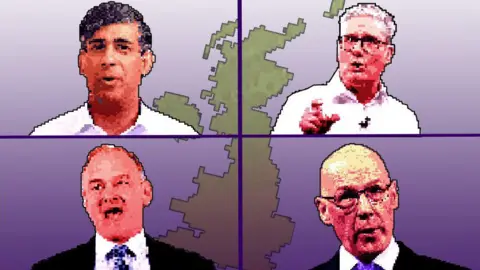 BBC/Getty/PA
BBC/Getty/PAYou’ve heard politicians talking about tax, immigration and the economy, but there’s one topic they don’t tend to mention.
Video games.
The UK’s games industry is globally respected, employs an estimated 76,000 people and is thought to bring £6bn a year to the UK economy.
It’s also a sector in the middle of a crisis.
Over the last 18 months thousands of workers worldwide have lost their jobs and studios have been shut down.
Much of the focus has been on big names such as Microsoft and Sony, both of which have laid off hundreds of staff in 2024.
But smaller studios are feeling the pinch too.
“It’s not great and I think it’s pretty obvious,” says Greg Lee.
“Every industry is struggling right now. But investment is drying up, people don’t want to take the risk right now.
“And a lot of studios are suffering heavily because of that.”
Greg’s the founder of Team Terrible, makers of viral hit indie horror game The Baby in Yellow.
Described as a “Lovecraftian babysitting game” it’s been downloaded millions of times.
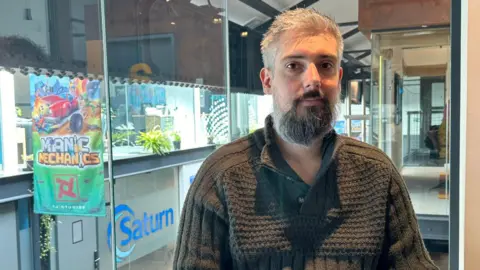
Since then, Team Terrible has moved into an office on Dundee’s waterfront – a hub for game developers.
It grew out of 4J Studios, which found success developing Minecraft for mobiles and consoles.
The Scottish city has a rich gaming heritage and – stop us if you’ve heard this one before – is the birthplace of Grand Theft Auto.
Thanks to its reputation and earlier investment in its development scene, Greg says, Dundee’s a great place to make games.
“It’s a very, very small city, which means that all the game studios know each other very well,” he says.
“So there’s definitely much more feeling of community, at local events you’ll pretty much meet the entire range of all studios here.
“And I think that’s really important. So it’s very easy to find new talent because you know most of the people in the city and it’s a really, really good place to grow because there’s people around to support you.”
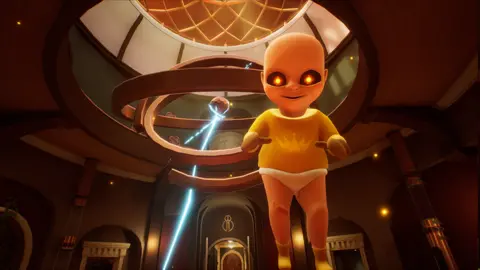 Team Terrible
Team TerribleAccording to industry trade body UK Interactive Entertainment (UKIE) there are more than 2,000 gaming businesses in Britain.
Like Dundee, towns and cities such as Manchester, Guildford, Cambridge and Brighton are home to clusters of large and small games developers.
Team Terrible staff Fergus Coyne and Jonathan Rodger say they’ve benefited from having other people in the industry close by.
“People nearby that share the same passion as you do, you’re never feeling alone,” says Jonathan, a Dundee native.
“You can talk to people about projects, you basically are fighting the same battles.”
Both studied in the city before finding jobs in gaming, and say having a community around them is a bonus.
But Fergus, who’s originally from Stirling, says the industry is a “scary place” at the moment, and believes more could be done to help developers.
“As of now, gaming’s still not recognised as its own sector,” he says.
“It’s lumped in with the screen industry, which includes film and TV.
“So having it not recognised in its entirety doesn’t really bode well for us feeling like we’re being represented.
“There’s more talking happening, but there’s still been no concrete information coming through.”
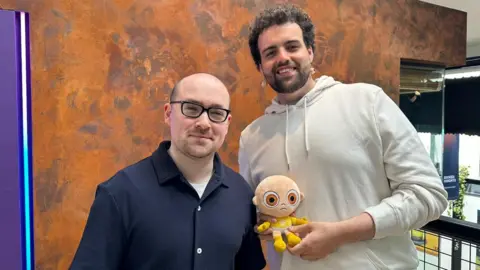
How can MPs help the games industry?
Both Labour and the Conservatives mention gaming in their manifesto plans for economic growth, but with no specific policies.
The SNP and Lib Dems say they want to rejoin the EU’s Creative Europe scheme that could provide funding for studios.
Greg says that he’d like to see politicians engage more with the games industry to go beyond a “cookie cutter solution”.
“I think more investigation needs to be put in to see what individual studios need at different scales,” he says.
He believes the UK’s setup for supporting games companies is “antiquated” compared with countries such as Canada, and says he’s seen a “brain drain” of talented people moving abroad where wages are higher.
“I think in order to reverse that we need to change policy to encourage students to set up here to give opportunities to bring back some of those developers to the UK,” he says.
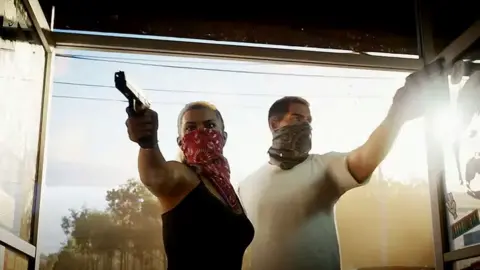 Rockstar Games
Rockstar GamesDespite gaming becoming a bigger part of people’s lives, UKIE CEO Nick Poole says, it’s “still getting relatively little airplay within the the national political dialogue”.
He says it’s important for the UK to be “at the forefront” of the changing landscape
“We have a new Hollywood right on our shores,” he says.
“The video game industry is global, the UK has an amazing heritage in that industry, we want it to have a really, really bright future in the industry as well.
“And so we need government to demonstrate that they care about the success of the UK video game sector.”
Nick says UKIE wants parties to support developers through tax reliefs, introduce a “digital creativity GCSE” and for the next government to increase investment in the gaming sector.
Like Greg, he wants to see support that’s tailored towards the industry, rather than mirroring schemes set up for other creative fields such as film and TV.
“We really want to sit down with them and work with them on solutions that genuinely work to scale up video games,” he says.
Nick says he’s hopeful that a younger generation of MPs more in touch with gaming will be more receptive.
What do the parties say?
BBC Newsbeat approached the Conservatives, Labour, the Liberal Democrats and the SNP to ask for further detail on how they’d support the games industry.
Thangam Debbonaire, Labour’s shadow culture, media and sport secretary, said the party would “focus on Britain’s world class creative industries – like gaming – to create jobs and boost the economy”.
“We’ll open up education and cultural opportunities, accessible to all. We’d bring in a new plan for creative industries and do an expert review on embedding creative learning in schools,” she said.
A Liberal Democrat spokesperson said: “The UK’s thriving video game industry makes a huge contribution to our economy and is responsible for thousands of good jobs, and we need to ensure it continues to go from strength to strength.
“The Liberal Democrats are calling for a proper industrial strategy to give our digital industries the support and certainty they need, and for serious investment in skills training so that more people are able to access opportunities in tech.”
The Conservatives and The SNP haven’t yet added to what’s in their manifestos.
Allow Google YouTube content?
Greg says Team Terrible is actively working with the Scottish government to improve relationships and understanding of the industry.
“They seem very receptive but it’s very early days,” says Greg.
“It’s difficult to tell long-term if there’s going to be genuine impact.”
Greg says he hopes the next government will see value of the games industry and work to boost it.
“I think the UK has the potential to be a real powerhouse in the past that it has been and there’s a lot of big studios that still exist here.
“But in order to keep that going into the future, there needs to be change.
“And I think there is potential but it will take a lot of effort.”




Be the first to comment